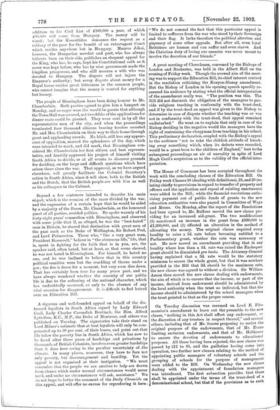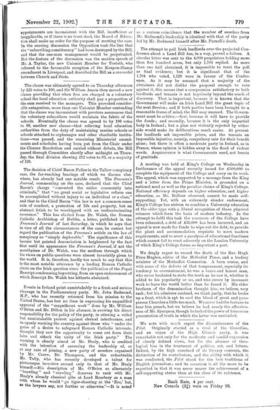On Tuesday discussion was resumed on Lord E. Fitz- maurices
amendment to leave out the preamble to the new clause, " nothing in this Act shall affect any endowment, or the discretion of any trustees in respect thereof," and several others, including that of Mr. Soares proposing to revive the original purpose of the endowments, that of Mr. Evans limiting sectarian endowments, and that of Mr. Hobhouse to ensure the devotion of endowments to educational purposes. All these having been rejected, the new clause was passed by 212 to 95, and the guillotine having come into operation, two further new clauses relating to the method of appointing public managers of voluntary schools and the grouping of schools for the purpose of management were added to the Bill. On Wednesday the new clause dealing with the appointment of foundation managers was introduced. The first subsection provides that these shall be appointed under the terms of the trust-deed of a denominational school, but that if the provisions as to such
appointments are inconsistent with the Bill, insufficient or inapplicable, or if there is no trust-deed, the Board of Educa- tion shall make an order for the purpose of meeting the case. In the ensuing discussion the Opposition took the line that the "subscribing constituency" had been destroyed by the Bill, and that the one-man management would be perpetuated. But the feature of the discussion was the maiden speech of Mr. A. Taylor, the new Unionist Member for Toxteth, who referred to the favourable reception of the Kenyon-Slaney amendment in Liverpool, and described the Bill as a concordat between Church and State.











































 Previous page
Previous page